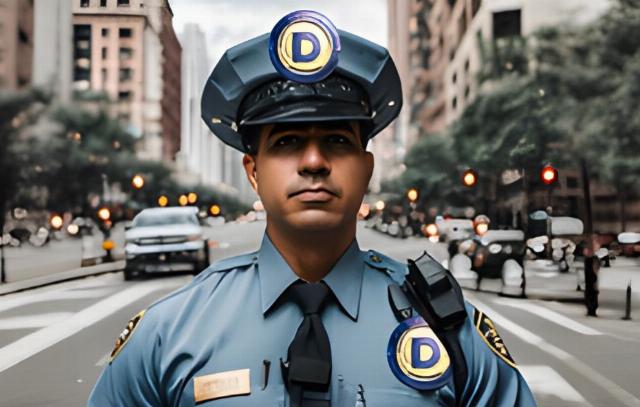Are ‘Brown Shirt’ laws coming to America?
In a recent move that has ignited both support and controversy, Virginia Governor Glenn Youngkin vetoed a series of bills that would have potentially opened the door for illegal immigrants to serve as police officers. This decision stands in stark contrast to the policies we might have seen under former Governor Ralph Northam, highlighting a pivotal moment in the ongoing debate over immigration policy and law enforcement qualifications in the United States.
The action taken by Governor Youngkin brings to the forefront a significant concern regarding the integrity and standards of law enforcement agencies. At its core, the debate is not merely about the legal status of individuals but about the prerequisites for holding positions of authority and trust in our communities. The governor’s veto is seen by many as a stand to uphold the rule of law and ensure that those entrusted to enforce it are themselves in compliance with our country’s laws.

Image by AI.
This decision, however, also touches upon a broader and more contentious discussion. I refer to the proposed legislative changes as “brown shirt laws.” This term draws a chilling parallel to how Adolf Hitler’s SA (Sturmabteilung or Storm Detachment) disrupted the established order in Nazi Germany, replacing traditional law enforcement with forces loyal to Nazi ideology. This historical analogy serves as a cautionary tale of the dangers when the lines between law enforcement, immigration policy, and political agendas become blurred. The term “brown shirt laws” I’ve coined denotes the potential deputizing of police officers who are illegal aliens, evoking the risks of undermining the legitimacy and authority of law enforcement through political and ideological influence.
The concern is that by potentially lowering the standards or altering the prerequisites for those in law enforcement roles to include individuals who are not legally residing in the country, states could inadvertently undermine the authority and legitimacy of their police forces. Such measures, critics argue, could lead to a scenario where the enforcement of laws is influenced by political and ideological considerations rather than the principles of justice and equality under the law.
It is crucial, therefore, to approach this issue with a balanced perspective. Immigration is undeniably a complex and multifaceted issue, requiring compassionate and comprehensive solutions. The contributions of immigrants to our communities are vast and varied, and many have demonstrated a profound commitment to upholding the values and laws of the United States. However, the proposition to allow individuals who have not obtained legal status to hold positions of authority in law enforcement poses fundamental questions about the criteria for such roles and the message it sends about adherence to the laws of the land.
As states across the country grapple with these questions, it is essential that the dialogue remains focused on ensuring the safety, security, and integrity of our communities. The lessons of history remind us of the need to safeguard the institutions of law enforcement from becoming tools of political expediency. In this light, Governor Youngkin’s veto is not merely a statement on immigration policy but a reflection on the broader issues of governance, law, and the enduring values upon which our society is built, ultimately affirming the paramount importance of the rule of law.
Michael Letts is the founder, President, and CEO of InVest USA, a charitable organization that provides bulletproof vests to police officers.
FOLLOW US ON
Recent Articles
- Transgender Armageddon: The Zizian Murder Spree
- Jasmine Crockett, Queen of Ghettospeak
- The Racial Content of Advertising
- Why Liberal Judges Have a Lot to Answer For
- Dismissing Evil and Denying the Holocaust — What’s the Endgame?
- The Witkoff Warning: Will Jordan’s King Fall?
- Can Trump Really Abolish the Department of Education?
- Carney’s Snap Election -- And Trump Saw It Coming
- We Can Cure Democracy, But Can We Cure Stupid?
- George Clooney: Master of Cringe
Blog Posts
- Two new revelations about the Signal leak, along with two theories
- Big Tech’s Invisible Hand: How Google and Meta manipulate our elections
- New report: Netherlands is now euthanizing minors
- Tantalizing tidbits: Five news stories about leftists, and sea lions, acting aggressively
- Rockets to Roses: Israel’s bizarre trade cycle with Aza
- Fort Knox? Gold cams!
- There is no birthright citizenship for illegal aliens
- Turn off the phone. Close the laptop.
- Nine reasons Democrats are doomed to irrelevance
- Wagner College should restore Trump’s honorary degree—and set a national example against cancel culture
- The Signal Scandal was a nothingburger, but the WSJ takes the opportunity to attack Vance
- The Trump effect: An unprecedented investment surge and economic renewal
- Hydrocarbon-friendly Trump a match for energy-hungry India
- And Big Bird can’t sing
- The DC appellate court order affrming Judge Boasberg dishonestly ignores its lack of jurisdiction






